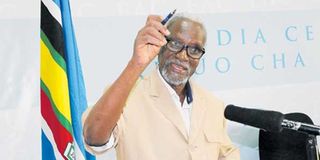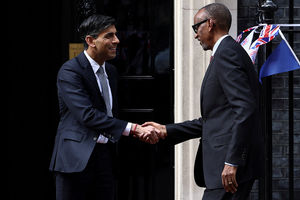Eala set to bounce back after Kenyan polls: EAC

What you need to know:
- The East African Legislative Assembly (Eala) will also be fully constituted after a fresh nomination of members from South Sudan because the earlier list was rejected.
The East African Community (EAC) yesterday allayed fears on its legislative organ, saying it would bounce back to business once the Kenya elections are over.
The East African Legislative Assembly (Eala) will also be fully constituted after a fresh nomination of members from South Sudan because the earlier list was rejected.
The assurance was made by Ugandan third Deputy Prime Minister Alhaj Kirunda Kivejinja during a media briefing on the delayed inauguration of the Fourth Assembly.
“Eala cannot be fully constituted until Kenya and South Sudan pick their members to join those from the other partner states and are sworn in,” he said. He said he had been assured by the Juba authorities that the names of the nine nominees from South Sudan would be sent to Arusha in a few days’ time.
Dr Kivejinja said although he was optimistic about the Kenyan elections, it can take some time before the names of the country’s candidates nominated for Eala are received in Arusha.
Reports had been circulating in Arusha that activities of the regional Parliament would remain suspended for up to end of the year or early next year due to the Kenyan elections.
In Kenya, the process to pick the nominated MPs has to involve both the National Assembly and the Senate which will convene sometime after the outcome of the August 8 polls.
There had been speculations that the tight race for the polls, especially the presidency, between the ruling Jubilee and Nasa candidates could end up in a run-off, thus delaying the convening of the Kenya Parliament and Senate to deal with regional matters.
But Dr Kivenjinja, who doubles as the current chairperson of the EAC Council of Ministers, the policy organ of the Community,told reporters he was not worried of the Kenyan situation.
“Why worry on the Kenyan polls?” he asked. “Our observer team is already on the ground and we anticipate things would move smoothly,” he told reporters at the EAC headquarters.
Swearing in of new MPs and subsequent inauguration of the Fourth Assembly of the regional Parliament was scheduled to be held on June 5 in Arusha after the end of tenure of the Third Assembly the day before.
However, this could not take place because Kenya had not sent in the names of its candidates following wrangles between the ruling and the opposition parties on the modalities of picking them.
By then the Kenyan Parliament had not been dissolved to pave way for the elections. It was later dissolved on June 15, sealing the chances of the Fourth Assembly inaugurated soon.
As if to add salt to injury, this coincided with the East African Court of Justice (EACJ) granted an ex-parte restraining the swearing in of the nominated MPs from South Sudan. That followed an application filed by a South Sudanese national, Mr Wani Santino Jada, who said the nine lawmakers from his country were not democratically elected but merely handpicked by President Salva Kiir.
The applicant later withdrew the case after the South Sudan government’s assurances to hold fresh elections for the regional MPs -- the same day Kenya disbanded its Parliament which was to elect Eala members.
According to its Rules of Procedure, Eala cannot be constituted and allowed conduct its business in the absence of MPs from one EAC partner state.
Eala is the legislative organ of the EAC with nine elected members each from the six partner states--Tanzania, Uganda, Kenya, Burundi, Rwanda and South Sudan.
For the first time in its 16-year history, there will be representatives from South Sudan this year, bringing to 54 the number of elected members, up from the current 45.
This will be the second time for Eala activities to stall due to failure by Kenya to pick its representatives after the opposition challenged the process in which the country’s candidates were nominated.
Due to the stalemate which was resolved through a Court ruling, Parliament could not hold sessions for several months from October 2006 to June 2007.




